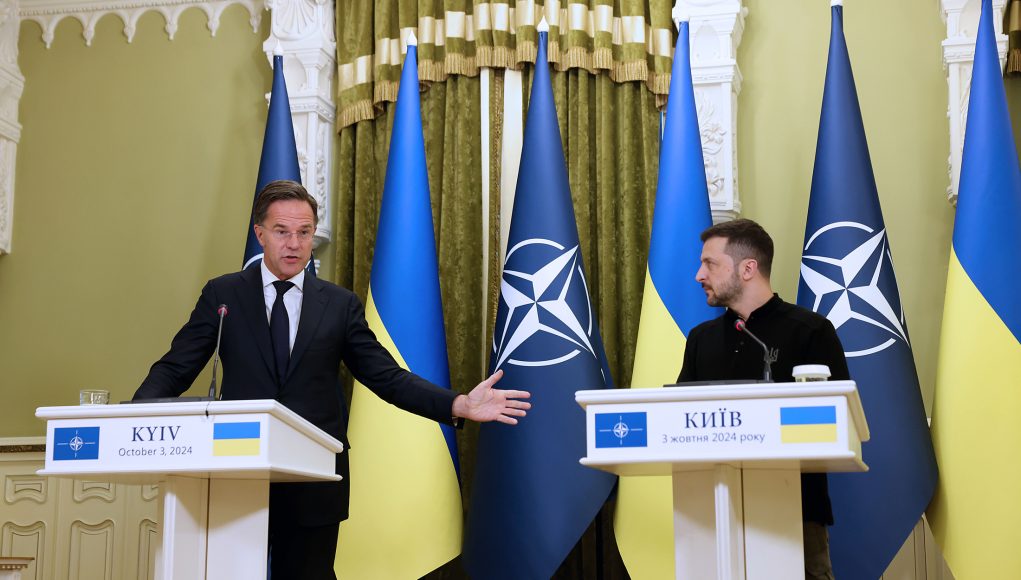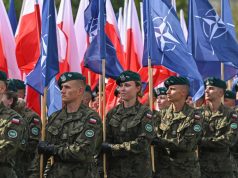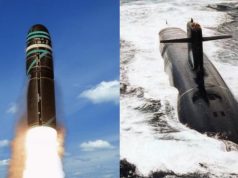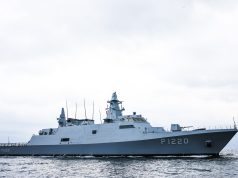Noul Secretar General al NATO, Mark Rutte, a sosit la Kiev joi, la nici două zile după ce şi-a preluat funcţia, pentru a asigura încă o dată Ucraina de sprijinul occidental, în timp ce forţele ucrainene sunt în dificultate pe front, informează AFP şi dpa.
Fostul premier olandez a avut la Kiev o întrevedere cu preşedintele ucrainean Volodimir Zelenski.
“Este prioritatea şi privilegiul meu de a face să avanseze acest sprijin” occidental “pentru ca Ucraina să câştige” în faţa Rusiei, a declarat Rutte în timpul unei conferinţe de presă alături de Zelenski.
De asemenea, Rutte a subliniat că Ucraina “este mai aproape ca niciodată de NATO şi îşi va continua drumul până când va deveni membră a alianţei noastre”.
La rândul său, Volodimir Zelenski a declarat că ucrainenii merită să adere la NATO, iar Moscovei trebuie să i se dea “un semnal clar că securitatea garantată pentru Ucraina şi pentru întreaga Europă este inevitabilă”.
Preşedintele ucrainean a reiterat că ţara sa are nevoie de arme de apărare şi cu rază de acţiune lungă, remarcând totodată că susţinătorii Ucrainei “prelungesc procesul” de a i le livra.
Zelenski a adăugat că aliaţii NATO ar putea ajuta la apărarea Ucrainei în faţa rachetelor ruse exact cum ei apără Israelul de atacurile iraniene. “Doborârea în comun a rachetelor iraniene nu diferă de o doborâre în comun a rachetelor ruse”, a subliniat preşedintele ucrainean, potrivit dpa. “Suntem conştienţi că este vorba de o decizie dificilă” şi “ei (aliaţii) încă nu sunt gata” să doboare împreună cu Ucraina rachetele ruse, a adăugat el, potrivit AFP.
Rutte este unul dintre cei mai activi susţinători ai Ucrainei în Europa de la declanşarea invaziei ruse în februarie 2022 şi calificat drept “rusofob” de Moscova.
El a fost inclusiv vârful de lance al eforturilor menite să doteze Kievul cu avioane de luptă F-16, o decizie calificată drept “istorică” de către Zelenski în timpul deplasării sale în Ţările de Jos.
De asemenea, când Mark Rutte conducea guvernul olandez, Ţările de Jos au semnat în acord pentru două miliarde de euro asistenţă militară pentru Ucraina timp de 10 ani.
Începându-şi marţi prima zi la conducerea NATO, Rutte a făcut din sprijinul pentru Ucraina una dintre cele trei priorităţi ale mandatului său.
Preşedintele rus Vladimir Putin “trebuie să realizeze” că NATO “nu va ceda” în susţinerea sa pentru Kiev, a subliniat Mark Rutte în timpul primei sale conferinţe de presă la Bruxelles.
Această declaraţie fermă de susţinere contrastează însă cu apelurile tot mai multora în Occident care insistă asupra deschiderii de negocieri cu Rusia.
Problema amplorii şi perenităţii ajutorului occidental se pune cu atât mai mult cu cât Ucraina este în al treilea an de război, ţinând cont în special de preţul acestui sprijin şi de riscul escaladării conflictului.
Iar poziţia americană, principalul susţinător al Kievului şi motor al NATO, riscă să se schimbe radical în cazul în care, după alegerile prezidenţiale din noiembrie, la Casa Albă ar reveni Donald Trump.
Rutte s-a deplasat deja de mai multe ori în Ucraina în calitate de şef al guvernului olandez în timpul războiului, vizitând nu doar Kievul, ci şi Odesa (sud), port-cheie la Marea Neagră, şi Harkovul (nord-est), al doilea oraş ca mărime al ţării situat lângă frontiera rusă şi vizat aproape zilnic de atacuri aeriene.
Un nou atac nocturn al Moscovei a făcut la Harkov 11 răniţi, printre care un copil, potrivit unui nou bilanţ anunţat joi de serviciile de urgenţă.
Deplasarea lui Mark Rutte la Kiev are loc într-un moment foarte dificil pentru Ucraina, ale cărei forţe militare duc lipsă de recruţi şi de arme, iar rezultatul este că armata ucraineană cedează teren în est, scrie Agerpres.
Dear Volodymyr,
Thank you for your warm welcome.
This is now my fifth time in Ukraine since the full onslaught of Russia started in February 2022. Together we visited Odessa, we visited Kharkiv, and obviously we had numerous meetings here in Kyiv. But this is my very first time as NATO Secretary General, and it was important to me that I come to Ukraine at the start of my mandate.
To make crystal clear to you, to the people of Ukraine, and to everyone watching, that NATO stands with Ukraine.
As the new NATO Secretary General,
it is my priority and my privilege to take this support forward,
working with you to ensure that Ukraine prevails.
Volodymyr, I have said this before and I say it again, your tireless leadership is an inspiration to me, to us all.
The dedication of your armed forces and the determination of the Ukrainian people remind us of just how precious freedom is.
And how crucial it is that we do all we can to defend it.
And this is why NATO was founded 75 years ago –
to safeguard the freedom and security of all of our members.
And this is why we are so committed to supporting Ukraine –
because your security matters for ours,
and your fight for freedom reflects our core principles and values.
NATO Allies have provided Ukraine with unprecedented support since Russia launched its full-scale invasion in 2022.
Including more than 99% of all military aid.
But we know that you need more.
So Allies agreed at the NATO Summit in Washington this summer to make sure we could provide you with more –
more equipment, more training, more support.
We are setting up a NATO Command
to coordinate the provision of security assistance and training –
helping to ensure that Ukraine has what it needs,
gets what is promised,
and that the support provided today contributes to building a NATO-interoperable future, in the future.
Allies also have agreed to a financial pledge.
With a baseline of 40 billion euros worth of military aid within a year.
And a commitment to review this level of support every year,
so that Ukraine has what it needs to prevail.
We know the need is urgent.
And we are working hard to do more, and more quickly.
In the last few weeks, several Allies announced further military aid for Ukraine
Including new contributions from Denmark, from Latvia, the United Kingdom, and nearly 8 billion dollars of assistance from the United States.
Supporting Ukraine and replenishing our own stocks means increasing industrial production, and that will be a priority for me.
That is why in Washington, Allies agreed to enhance our defence industrial capacity.
Working among Allies – on both sides of the Atlantic.
And also with you, with Ukraine.
To help build your domestic capacity, which has proven so effective and can only be improved with further investment and further innovation.
Indeed, as you said, today, we discussed all of these elements.
The areas where Ukraine needs further support.
And the ways in which NATO is working to provide it.
Ukraine is closer to NATO than ever before.
And will continue on this path until you become a member of our Alliance.
I very much look forward to that day.
Mr President,
dear Volodymyr,
NATO stands with Ukraine.
For your security, and for ours.
Thank you once again.
Suspilne, Ukrainian TV
[inaudible], the Public Broadcaster of Ukraine. So, the first question is for both of you. The Financial Times reported that there are preliminary indications that the US President might agree to change the status of Ukraine’s NATO membership bid, before he leaves his office.
So from your perspective, are Allies ready to move forward with Ukraine’s membership in NATO? And the second one, Mr. Secretary General, so there is information that certain Allies are ready to shut down Russian drones and missiles over NATO member states. So is it possible, from your perspective, if you understood that, if it violates their airspace? So from your perspective, do you expect this scenario in the close future?
NATO Secretary General Mark Rutte
Well, first on NATO and membership. And as you know, at the last NATO Summit, which took place in Washington in July this year, Allies agreed, and this is important, that Ukraine’s path to membership is irreversible.
And as I said in my short statement, Ukraine is closer to NATO than ever before. We now have a Comprehensive Assistance Package to help Ukraine implement reforms. I met with many people today who are working on that with the Ukrainians. We are establishing this NATO command, and it will help to coordinate and provide security assistance, but also training for Ukraine. I already mentioned also the 40 billion euros which is there to fund military aid for Ukraine. And as you know, many Allies have now signed bilateral security agreements with Ukraine. And that means that Ukraine gets stronger day by day, more interoperable with NATO and better prepared than ever to join our Alliance. And this is basically building the bridge to NATO membership for Ukraine.
And I think the day will come that Ukraine is a full member of NATO. And let me add to that, if somebody might think otherwise, that Russia on this issue has no vote and no veto. On your other issue of Allies to shoot down Russian missiles, I think that was your question. Of course, shooting down drones or missiles violating Allied territory are, of course, decisions for the national authorities. NATO has already significantly reinforced its air defences on the eastern flank. And we recognise fully the rights of every Ally to protect its own airspace. And of course, this is also an issue for NATO as a whole. And this is why Allies are continuing to consult closely when these situations arise. And NATO authorities, I can assure you, will continue to work with Allied authorities to ensure effective air and missile defence.
BBC News
Firstly, to the Secretary General, your first visit here as Secretary General of NATO. People, of course, in Ukraine, don’t want symbolic visits. They want concrete steps. Looking ahead to Ramstein, do you think we can expect some key decisions, for example, permission for Ukraine to use long range Western made missiles on military targets inside Russia?
Or do you think that permission just isn’t going to come? And to President Zelenskyy, are you concerned that what’s happening in the Middle East is distracting from support for Ukraine, your ideas in your victory plan? And if I could just ask you as well, President Zelenskyy, following reports of Ukraine’s withdrawal from the town of Vuhledar, do you think you can continue or can you halt Russian advances? Thank you.
NATO Secretary General Mark Rutte
Well, to your first question, President Biden called that meeting at the leaders-level, and I think that is particularly important that we have that meeting on Saturday, October the 12th in Ramstein, with Allies and of course with Ukraine.
More particularly focusing on your question on restrictions, or lifting of restrictions, for the long-range strikes, let me say a couple of things. First of all, Ukraine obviously has the right to defend itself, and international law here is on the side of Ukraine, meaning that this right does not end at the border. And Russia is pursuing this illegal war, and that means that targeting Russian fighter jets and missiles before they can be used against Ukraine’s civilian infrastructure can help save lives.
The only country here that has crossed a red line is not Ukraine, it is Russia, by starting this war. At the same time, it is up to each Ally to determine its support for Ukraine. And I know some of these discussions are ongoing, but in the end, that’s not for NATO. That’s up for each Ally to decide what restrictions are there on the weapons they deliver to Ukraine.
#NATO
#Ukraine




